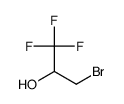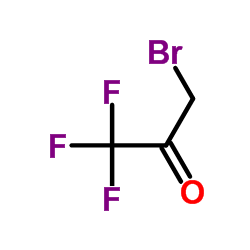88378-50-1
| 中文名 | 3-溴-1,1,1-三氟-2-丙醇 |
|---|---|
| 英文名 | 3-bromo-1,1,1-trifluoro-2-propanol |
| 英文别名 |
Fmoc-4-phenyl-phenylalanine
Fmoc-L-4-phenyl-phenylalanine (S)-3-biphenyl-4-yl-2-(9H-fluoren-9-ylmethoxycarbonylamino)propionic acid (S)-2-(benzyloxycarbonylamino)succinimide (S)-3-Bromo-1,1,1-trifluoro-2-propanol (S)-(+)-1-Bromo-3,3,3-trifluoro-2-propanol (S)-3-benzyloxycarbonylaminopyrrolidine-2,5-dione N-benzyloxycarbonyl-L-aspartic acid imide Fmoc-Bip-OH (S)-3-N-carbobenzyloxyaminosuccinimide (S)-2-(((9H-fluoren-9-yl)methoxy)carbonylamino)-3-(biphenyl-4-yl)propanoic acid (3S)-3-(benzyloxycarbonylamino)succinimide MFCD00040945 3-(S)-N-benzyloxycarbonylaminopyrrolidine-2,5-dione Fmoc-4-phenyl-L-alanine (s)-(2,5-dioxo-pyrrolidin-3-yl)-carbamic acid benzyl ester (S)-3-N-Cbz-amino-succinimide (S)-benzyl 2,5-dioxopyrrolidin-3-ylcarbamate Fmoc-(p-Phe)Phe-OH |
| 密度 | 1.861 g/mL at 25ºC(lit.) |
|---|---|
| 沸点 | 124.5ºC743 mm Hg(lit.) |
| 分子式 | C3H4BrF3O |
| 分子量 | 192.96200 |
| 闪点 | 110 °F |
| 精确质量 | 191.94000 |
| PSA | 20.23000 |
| LogP | 1.30450 |
| 折射率 | n20/D 1.4(lit.) |
| 分子结构 | 1、 摩尔折射率:25.62 2、 摩尔体积(m3/mol):105.5 3、 等张比容(90.2K):241.3 4、 表面张力(dyne/cm):27.3 5、 极化率(10-24cm3):10.16 |
| 计算化学 | 1.疏水参数计算参考值(XlogP):1.5 2.氢键供体数量:1 3.氢键受体数量:4 4.可旋转化学键数量:1 5.互变异构体数量:无 6.拓扑分子极性表面积20.2 7.重原子数量:8 8.表面电荷:0 9.复杂度:71.4 10.同位素原子数量:0 11.确定原子立构中心数量:0 12.不确定原子立构中心数量:1 13.确定化学键立构中心数量:0 14.不确定化学键立构中心数量:0 15.共价键单元数量:1 |
| 更多 | 1. 性状:未确定 2. 密度(g/mL25 ºC):1.861 3. 相对蒸汽密度(g/mL,空气=1):未确定 4. 熔点(ºC):未确定 5. 沸点(ºC,常压):未确定 6. 沸点(ºC743mmHg):124.5 7. 折射率:n20/D 1.4 8. 闪点(ºF):110 9. 比旋光度(º):未确定 10. 自燃点或引燃温度(ºC):未确定 11. 蒸气压(Pa,):未确定 12. 饱和蒸气压(kPa,60ºC):未确定 13. 燃烧热(KJ/mol):未确定 14. 临界温度(ºC):未确定 15. 临界压力(KPa):未确定 16. 油水(正辛醇/水)分配系数的对数值:未确定 17. 爆炸上限(%,V/V):未确定 18. 爆炸下限(%,V/V):未确定 19. 溶解性:未确定 |
Synonym:3-Bromo-1,1,1-trifluoroisopropano Section 2 - COMPOSITION, INFORMATION ON INGREDIENTS
Risk Phrases: 36/37/38 Section 3 - HAZARDS IDENTIFICATION EMERGENCY OVERVIEW
Irritating to eyes, respiratory system and skin.The toxicological properties of this material have not been fully investigated. Potential Health Effects Eye: Causes eye irritation. Skin: Causes skin irritation. Ingestion: The toxicological properties of this substance have not been fully investigated. Inhalation: Causes respiratory tract irritation. The toxicological properties of this substance have not been fully investigated. Chronic: Not available. Section 4 - FIRST AID MEASURES Eyes: Flush eyes with plenty of water for at least 15 minutes, occasionally lifting the upper and lower eyelids. Get medical aid. Skin: Get medical aid. Flush skin with plenty of water for at least 15 minutes while removing contaminated clothing and shoes. Ingestion: Get medical aid. Wash mouth out with water. Inhalation: Remove from exposure and move to fresh air immediately. If not breathing, give artificial respiration. If breathing is difficult, give oxygen. Get medical aid. Notes to Physician: Section 5 - FIRE FIGHTING MEASURES General Information: As in any fire, wear a self-contained breathing apparatus in pressure-demand, MSHA/NIOSH (approved or equivalent), and full protective gear. Extinguishing Media: Use water spray, dry chemical, carbon dioxide, or chemical foam. Section 6 - ACCIDENTAL RELEASE MEASURES General Information: Use proper personal protective equipment as indicated in Section 8. Spills/Leaks: Absorb spill with inert material (e.g. vermiculite, sand or earth), then place in suitable container. Section 7 - HANDLING and STORAGE Handling: Avoid breathing dust, vapor, mist, or gas. Avoid contact with skin and eyes. Storage: Store in a cool, dry place. Store in a tightly closed container. Section 8 - EXPOSURE CONTROLS, PERSONAL PROTECTION Engineering Controls: Use adequate ventilation to keep airborne concentrations low. Exposure Limits CAS# 88378-50-1: Personal Protective Equipment Eyes: Wear appropriate protective eyeglasses or chemical safety goggles as described by OSHA's eye and face protection regulations in 29 CFR 1910.133 or European Standard EN166. Skin: Wear appropriate protective gloves to prevent skin exposure. Clothing: Wear appropriate protective clothing to prevent skin exposure. Respirators: Follow the OSHA respirator regulations found in 29 CFR 1910.134 or European Standard EN 149. Use a NIOSH/MSHA or European Standard EN 149 approved respirator if exposure limits are exceeded or if irritation or other symptoms are experienced. Section 9 - PHYSICAL AND CHEMICAL PROPERTIES Physical State: Liquid Color: clear, colorless Odor: Not available. pH: Not available. Vapor Pressure: Not available. Viscosity: Not available. Boiling Point: 124 - 126 deg C @ 760.00mm Hg Freezing/Melting Point: Not available. Autoignition Temperature: Not available. Flash Point: Not available. Explosion Limits, lower: Not available. Explosion Limits, upper: Not available. Decomposition Temperature: Solubility in water: Specific Gravity/Density: Molecular Formula: C3H4BrF3O Molecular Weight: 192.96 Section 10 - STABILITY AND REACTIVITY Chemical Stability: Not available. Conditions to Avoid: Incompatible materials. Incompatibilities with Other Materials: Strong oxidizing agents - strong reducing agents - strong acids - strong bases. Hazardous Decomposition Products: Carbon monoxide, carbon dioxide, hydrogen fluoride gas, hydrogen bromide. Hazardous Polymerization: Has not been reported. Section 11 - TOXICOLOGICAL INFORMATION RTECS#: CAS# 88378-50-1 unlisted. LD50/LC50: Not available. Carcinogenicity: 3-Bromo-1,1,1-trifluoro-2-propanol - Not listed by ACGIH, IARC, or NTP. Section 12 - ECOLOGICAL INFORMATION Section 13 - DISPOSAL CONSIDERATIONS Dispose of in a manner consistent with federal, state, and local regulations. Section 14 - TRANSPORT INFORMATION IATA Not regulated as a hazardous material. IMO Not regulated as a hazardous material. RID/ADR Not regulated as a hazardous material. Section 15 - REGULATORY INFORMATION European/International Regulations European Labeling in Accordance with EC Directives Hazard Symbols: XI Risk Phrases: R 36/37/38 Irritating to eyes, respiratory system and skin. Safety Phrases: S 26 In case of contact with eyes, rinse immediately with plenty of water and seek medical advice. S 37/39 Wear suitable gloves and eye/face protection. WGK (Water Danger/Protection) CAS# 88378-50-1: No information available. Canada None of the chemicals in this product are listed on the DSL/NDSL list. CAS# 88378-50-1 is not listed on Canada's Ingredient Disclosure List. US FEDERAL TSCA CAS# 88378-50-1 is not listed on the TSCA inventory. It is for research and development use only. SECTION 16 - ADDITIONAL INFORMATION N/A |
| 危害码 (欧洲) | Xi: Irritant; |
|---|---|
| 风险声明 (欧洲) | 36/37/38 |
| 安全声明 (欧洲) | 26-36 |
| 危险品运输编码 | UN 1987 3/PG 3 |
| WGK德国 | 3 |
| 海关编码 | 2905590090 |
|
~15% 
88378-50-1 |
| 文献:Bucciarelli, Maria; Forni. Arrigo; Moretti, Irene; Torre, Giovanni Synthesis, 1983 , # 11 p. 897 - 899 |
| 上游产品 1 | |
|---|---|
| 下游产品 0 | |
| 海关编码 | 2905590090 |
|---|---|
| 中文概述 | 2905590090 其他无环醇的卤化、磺化等衍生物。监管条件:无。增值税率:17.0%。退税率:9.0%。最惠国关税:5.5%。普通关税:30.0% |
| 申报要素 | 品名, 成分含量, 用途, 包装 |
| Summary | 2905590090 other halogenated, sulphonated, nitrated or nitrosated derivatives of acyclic alcohols。Supervision conditions:None。VAT:17.0%。Tax rebate rate:9.0%。MFN tariff:5.5%。General tariff:30.0% |

